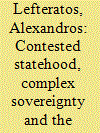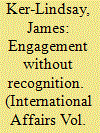| Srl | Item |
| 1 |
ID:
190854


|
|
|
|
|
| Summary/Abstract |
The emergence, longevity and resilience of contested states have redefined the relationship between sovereignty and territoriality. While fully-fledged states uphold the monopoly of authority, contested states seek to rewrite the sovereignty playbook and gain a seat among sovereign equals. This atypical antagonism, propped up by post-Westphalian statehood aspirations, has changed the way sovereignty is perceived and understood nowadays. Approaching sovereignty as multi-faceted, this article discusses contested statehood in the context of the EU's engagement overseas. Drawing on the literature of Europeanisation and complex sovereignty, it accounts for the influence of contested statehood on the EU's role and policies in contested states. Specifically, by delving into Kosovo's complex sovereignty (internal/external), the analysis measures the fluctuating impact of contestedness on the EU's employed policy frameworks and deployed crisis management tools unfolding a paradox that has defined the EU's foreign policy in Kosovo for years.
|
|
|
|
|
|
|
|
|
|
|
|
|
|
|
|
| 2 |
ID:
161366


|
|
|
|
|
| Summary/Abstract |
This article examines the diplomatic practices of contested states with the aim to challenge structural legal-institutional accounts of these actors’ international engagement, which are unsatisfactory in explaining change and acknowledging their agency. Considering contested states as liminal international actors, their diplomatic practices stand out for their hybridity in transcending the state versus nonstate diplomacy dichotomy, as well as for their structure-generating properties in enabling social forms of international recognition—absent legal recognition. The concept is empirically applied to examine the everyday interaction between the representatives of Palestine and Western Sahara and the European Union (EU)’s institutions in Brussels. It is argued that there has been a renewal and expansion of the Palestinian and Sahrawi repertoires of diplomatic practices vis-à-vis the EU, which has entailed growing hybridization. Innovation originated in more “transformative” diplomatic practices capitalizing on the contested states’ own political in-between-ness, which established relations that contributed to constituting and endogenously empowering them in the Brussels milieu. The way was thus paved for more “reproductive” diplomatic practices that mimic traditional state diplomacy to gain prominence. The impact achieved on “high politics” demonstrates how bottom-up practice-led change may allow contested states to compensate for their meagre material capabilities and punch above their structural weight in international politics.
|
|
|
|
|
|
|
|
|
|
|
|
|
|
|
|
| 3 |
ID:
138346


|
|
|
|
|
| Summary/Abstract |
This article examines the extent to which states are able to interact at an official level with a contested or de facto state—a state that has unilaterally declared independence but is not a member of the United Nations—without being understood to have recognized it. This is an area of increasing interest and relevance to policy-makers as the number of contested states has grown in recent years. In many cases, interaction may be important for ongoing peace efforts. However, there are also instances when a state is prevented from recognizing the territory in question for specific domestic or foreign policy reasons and so has to find alternative means by which to cooperate. Drawing on several key examples, notably Kosovo and the ‘Turkish Republic of Northern Cyprus’, but also with reference to Abkhazia, the article explores the limits of interaction across various different forms of bilateral and multilateral diplomatic activity. As is shown, albeit with some significant provisos, legal theory and historic practice suggest that diplomatic engagement does not constitute recognition if there is no underlying intent to recognize. This means that there is in fact a very high degree of latitude regarding the limits of diplomatic engagement with contested states. This is especially the case in bilateral contexts. Indeed, in some circumstances, the level of engagement can even amount to recognition in all but name.
|
|
|
|
|
|
|
|
|
|
|
|
|
|
|
|